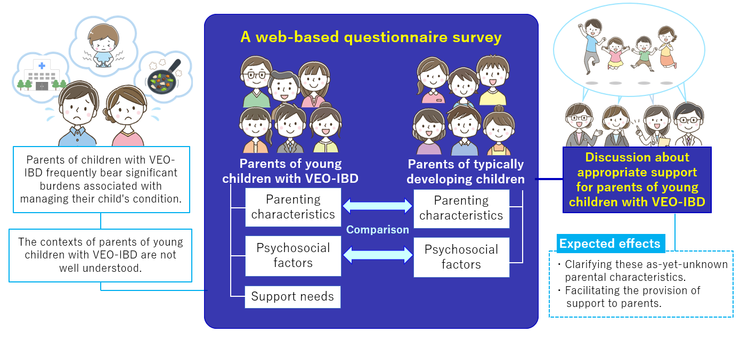A cross-sectional study of parenting, psychosocial characteristics, and support needs among parents of children with very early-onset inflammatory bowel disease
Abstract
Inflammatory Bowel Disease (IBD) is a chronic inflammatory disorder of the gastrointestinal tract. IBD developed and diagnosed before six years old is called very early onset IBD (VEO-IBD). Each year, approximately 40 children are diagnosed with VEO-IBD. This condition has garnered significant attention owing to its potential resistance to traditional IBD treatments and its possible incurability. The primary treatment objective for VEO-IBD is to maintain remission, defined as the absence of IBD symptoms, and to facilitate the unique growth and development of each child with the condition. Parents of children diagnosed with VEO-IBD frequently bear significant burdens associated with managing their child's condition. Specifically, parents of young children with VEO-IBD face considerable strain due to the daily care demands of the disease. Consequently, their psychosocial health may deteriorate more than that of parents with typically developing children. However, the contexts of parents of young children with VEO-IBD are not well understood. This study aims to identify the parenting characteristics, psychosocial factors, and support needs of parents with young children with VEO-IBD, compared with parents of typically developing children. For this study, young children are defined as those aged nine or younger. We will conduct a web-based questionnaire survey in several hospitals that treat children with VEO-IBD to recruit parents of children with VEO-IBD, and use an online panel to recruit parents of typically developing children. We will then perform various analyses to identify statistical differences between the two groups of parents. Based on our results, we will consider the appropriate support for these families.
Perspectives
Parents of children with VEO-IBD play a crucial role, not only in managing their child's diet and bowel movements, but also in ensuring their proper growth and development. These parents frequently encounter challenging situations due to conditions of children. Therefore, it is important that they receive understanding and support. This study aims to clarify these as-yet-unknown parental characteristics, thereby facilitating the provision of timely and appropriate support to parents who continue to grapple with their children's VEO-IBD. It is anticipated that this research will contribute to enhancing family support for children with VEO-IBD and furthering related research in this field.
Comments from principal researcher
Satomi Nomura, department of child nursing, national college of nursing, Japan.
As a nurse, I have spent considerable time assisting and studying children and families. Parents with children suffering from chronic disease encounter numerous challenges. Specifically, parents of children with VEO-IBD frequently experience feelings of guilt or distress, because their children develop the condition during the crucial period of forming the parent-child relationship. Supporting these parents is not only vital for reducing their burden, but also for promoting the healthy development of their children and the effective management of VEO-IBD. Through this research, I aim to contribute to the support for parents who have to manage chronic illnesses in a child.
Shared Researchers
Department of Gastroenterology, National Center for Child Health and Development, Mikako Yokoo


